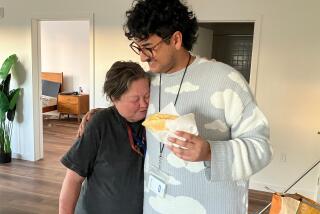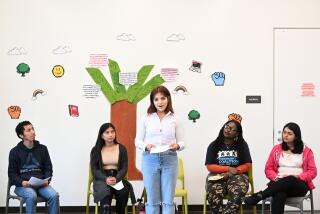Suddenly Sylvia
- Share via
With a deliberate blink of her eyes and a dryly exhaled laugh, Sylvia Prado revealed her amazing secret: She is an alert, bright and fun-loving person.
The world had thought otherwise since she suffered severe head injuries when, as a 13-year-old, she was struck by a car as she crossed a street near her Santa Ana home.
It was Jeanie McCabe, her special-education teacher at Santa Ana Valley High School, who understood the message Sylvia had to struggle so hard to deliver.
McCabe was humming a song while feeding her 16-year-old pupil when she noticed Sylvia’s eyebrows arching up and down. “I said, ‘Gosh, is my singing that bad?’ And Sylvia blinked her eyes,” says McCabe, recalling the conversation three years ago with the girl in her class who had been labeled severely disabled, mentally and physically.
“I said, ‘Does that mean yes?’ And, she blinked again. I told her, ‘You don’t want me to stop singing. You want me to get singing lessons.’ And she laughed.”
The display of humor convinced McCabe that Sylvia, trapped inside a body that was keeping her from expressing herself, was indeed a very capable child.
McCabe says she became confident that Sylvia, now 19, eventually could do the things--such as speak, communicate, sit up, feed herself and, most important, learn--that doctors and former teachers had said she would never do.
Since then Sylvia has made great strides in all those areas--with constant care and attention from her parents and sister, with McCabe’s dedication to teaching her and even with help from her father’s co-workers, who pitched in earlier this year to help buy the special talking computer that lets her communicate with words.
Most victims of head injuries, according to the American Medical Assn., only show signs of recovery for up to five years, which Sylvia’s progress has surpassed.
The Prado family recalls being told after the accident that Sylvia, once an able-bodied child with dreams of becoming a police officer, forever would be in a vegetative state.
The bleak prognosis came shortly after Sylvia was hit by a car while crossing Warner Avenue on Feb. 12, 1991. Sylvia, returning home from a neighborhood grocery store, was in the striped pedestrian crosswalk east of Bristol Street when a driver swerved around a stopped car and struck her. The driver was given a citation for failing to yield to a pedestrian; Sylvia, unconscious, was rushed to the hospital.
“She was in the middle of the street, bleeding from her eyes and nose,” recalls Veronica, Sylvia’s sister, now 16. “I yelled, ‘Sylvia!’ She was just stretched out. I kept yelling to the paramedics, ‘Don’t take her!’ I thought she would never come back if they took her away.”
Magdalena Prado weeps as her daughter tells the story.
“The doctors told me that she could hear but couldn’t understand and that she would never move again,” recalls Prado, 52. “They told me she probably would never be able to see either.”
*
Prado, at Sylvia’s bedside for one of the three daily exercise routines she takes her daughter through, says she is filled with hope and faith: “I exercise her arms and legs every morning, afternoon and night for about half an hour because it will help her to walk one day.”
Her mother tucks Sylvia into bed around 9 p.m. and wakes at 11, 3 a.m. and 5 to turn her so the teen won’t get bedsores. Sylvia’s sister helps with her daily care too--the two share a bedroom.
Five years ago, Sylvia could not sit up or control the saliva that constantly drooled from her mouth. Her arms were pressed against her body, her fingers tightly clenched. She was fed through a tube connected to her stomach.
In recent weeks, however, Sylvia has graduated from pureed food to finely chopped meals, fed to her by family members at home and by McCabe at school. She can sit upright in her wheelchair, doesn’t drool, can spread her fingers apart and can lift her arms without help.
And she is beginning to see.
A massive blood clot in Sylvia’s brain that had caused her eyes to be crossed was removed three years ago. Now she is learning eye movement.
“Sylvia’s not blind, and now her mom and I are teaching her to move her eyes,” McCabe says as she moves her index finger side to side in front of Sylvia--whose eyes follow McCabe’s finger.
McCabe picked up training tips from school vision, speech and physical therapists who work with Sylvia once or twice a week. Sylvia’s mother learns the therapeutic exercises from McCabe and applies them at home.
“M-m-m-a,” Prado says as she closes and opens her daughter’s mouth in an effort to train her to form the sound. With her mother’s fingers guiding her lips, Sylvia responds: “M-m-a.”
Prado recalls how adept Sylvia once was with language.
“I remember when Sylvia was 8 years old and I took her to the store,” Prado says. “She saw a woman who only spoke Spanish and couldn’t understand the cashier. Without hesitation, she went to the woman and translated for her.”
“She loved to joke around,” her mother says. “When her father would come home tired from a hard day at work, Sylvia always made him laugh.”
Sylvia often talked about helping people by becoming a police officer and offering translation services, her parents say.
“I used to tell her, it’s too dangerous to be a police officer,” Prado says. “But she would just say, ‘You can die any time, any where, so why not do what I like?’ ”
*
Sylvia’s courage and perseverance permeate her life today as she pushes herself to learn and regain body movement.
“Sylvia’s attitude is, ‘I’ll never give up,’ ” says McCabe, 50, of Orange. “I’ve never seen such remarkable improvement.
“When she came to me three years ago, I thought, ‘She’s going to be a challenge,’ ” says McCabe, sitting next to Sylvia, one of 14 students she works with currently. “Her paperwork said she was profoundly retarded. But are you?” Sylvia shakes her head in a steady side-to-side motion.
“I’ve always believed that people really do a lot more than you think they can,” says McCabe, who has been a special-ed teacher for 29 years. McCabe knows what it means to be misunderstood: As a child, she was classified as retarded until her dyslexia was diagnosed.
McCabe’s commitment to Sylvia has had tremendous impact, says Valley High Principal Robert Nelson. “If you don’t have people like Jeanie McCabe, you don’t have a program,” says Nelson. “Her efforts probably have changed Sylvia’s life forever. She’s given her some self-dignity and worth that she didn’t experience before because she was imprisoned without communication.”
When McCabe realized Sylvia could communicate, she wrote a letter of appeal for money to buy her a special computer. The letter was published in a local newspaper, and when employees at Waste Management of Orange County Inc. realized that Sylvia was the daughter of co-worker Luis Prado, they began a collection.
The co-workers raised enough money to buy the laptop computer--which has a chin switch that serves as a keyboard--and presented it to Sylvia earlier this year. The Macintosh verbally announces the letters of the alphabet so Sylvia can hear them and then choose the letters she wants by pressing the switch with her chin.
Her first message, which took two weeks to spell out: “Mom, I love you a lot.”
In gratitude to her father’s co-workers, who gave her back the gift of language, Sylvia wrote, “Thank you for caring about me.”
The words touched her father’s co-workers, who became entranced by Sylvia.
“I will never forget the day we presented the computer to her,” says Christy Kindig, recycling coordinator at Great Western Reclamation, a trash-hauling division of Waste Management. “She was so excited, so vibrant, so appreciative. . . . She was trapped for so long, and now she has freedom.”
*
In the past month, for the first time since the accident, Sylvia has been able to express her sadness over what happened to her. When she cried for hours in class and at home, her mother and McCabe cried too, because they saw it as a breakthrough. Says McCabe: “She’s getting in touch with her feelings and dealing with her pain. It’s a good thing.”
For about two years after the accident, Sylvia would express her frustration and rage in outbursts often mistaken for epileptic seizures.
Now she can give expression to her frustrations, wants and needs.
But it is Sylvia’s humor, which she displays freely, that is her trademark. She howls at a good joke and flashes wide grins when paid a compliment.
“Humor is a very elite thing, and she has it,” McCabe says. “It’s really been in her favor.”
Sylvia, who loves to listen to Latin recording artist Marco Antonio Solis, began her senior year at Valley High in September. In June, she will graduate with the rest of the class. She may even go to the prom.
Meanwhile, she will learn more sophisticated computer programs and work skills, McCabe says with pride. “Hopefully she’ll gain some independence. I believe she will continue to progress into her 30s and 40s.”
So does Sylvia.
In response to a question about her future, Sylvia taps out: “If God wills me to get better, I still want to be a police officer.”
More to Read
Sign up for Essential California
The most important California stories and recommendations in your inbox every morning.
You may occasionally receive promotional content from the Los Angeles Times.













